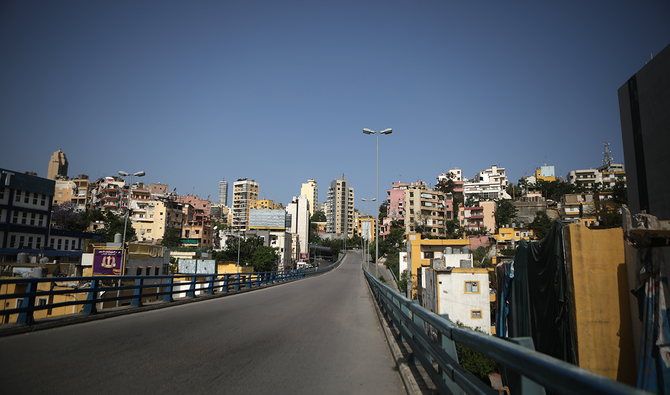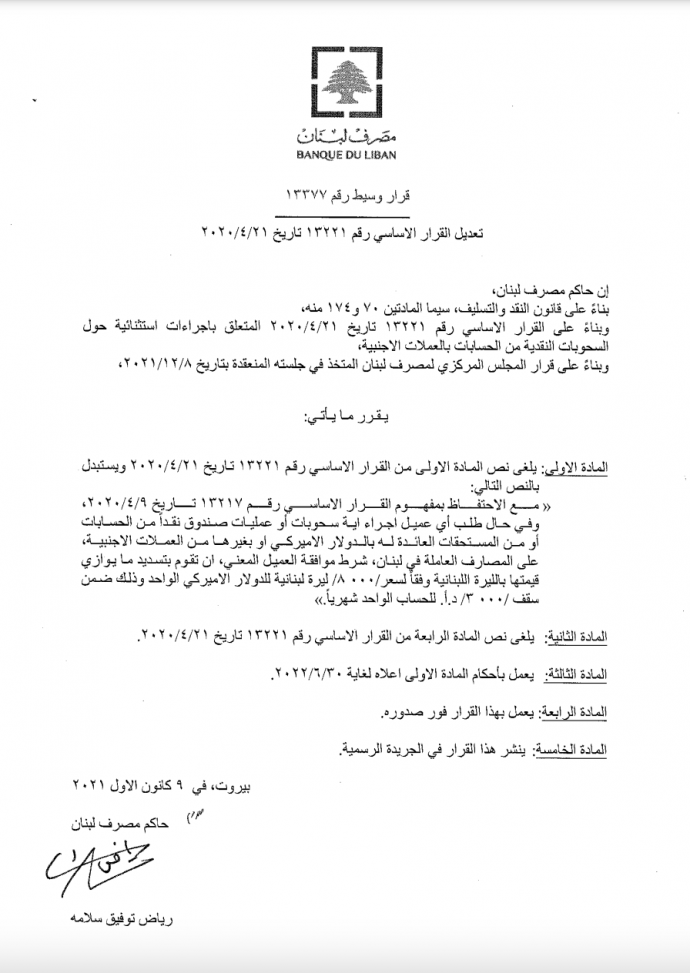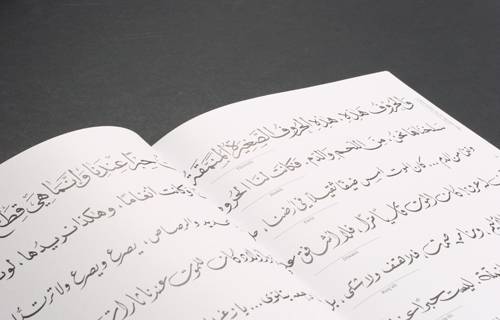Blog
Lebanon: A 2021 Recap
Another year has come and gone and we somehow managed to survive the sequel to 2020, yet the saga continues. From Coronavirus lockdowns to the continuous hyperinflation of the Lebanon Lira, 2021 was a year filled with various notable events.
January: Lockdown

This year began with a surge in Coronavirus cases where over 4,000 people were infected each day. As a result, a state of health emergency and an 11-day total lockdown – which was later extended by another two weeks – was declared. The streets of Lebanon were quiet during our isolation, except for the occasional runs to the supermarket or pharmacies.
Check out: Lebanon Announces Nationwide Lockdown Again
February: Vaccines
As countries all over the world began to vaccinate their people, 28,500 doses of the Pfizer-BioNTech vaccine arrived in Lebanon. The first people who received the vaccine were health care workers, and people over the age of 75. At the time, over 450,000 registered for their turn to receive their shots.
Check out: Breaking: Vaccine To Be Distributed For Free In Lebanon
March: Lira Reaches 10,000LBP
The Lebanese Lira reached the value of 10,000 per USD, resulting in further deterioration of the economy. Many took to the streets to protest against the government due to the declining financial state of the country, and the hardships they were yet to endure.
April: Increase in Food Prices
The month of Ramadan took place in April, and images surfaced on social media showing people’s empty fridges since food prices increased by 400 percent due to the declining economy. Today, more than 80 percent of people live below the poverty line.
Check out: UNESCWA Reports 74% Of Lebanese Population In Poverty
May: A Greater Reduction of Electricity
The Turkish power company, Karadeniz, – which supplied a quarter of the country’s electricity – decided to shut down due to not receiving payment within the last 18 months. Lebanon has faced electricity issues for decades, and this decision led to even more reduced hours of electricity.
Check out: Lebanon’s Powerplants May Stop Generating Electricity Mid May
June: World Bank and Lebanese Economy
The World Bank released a report stating that Lebanon’s crippled economy and financial state is likely to rank in the top 3 as one of the worst economic crises since the mid-nineteenth century, with the Lebanese Lira losing over 85 percent of its value.
Check out: World Bank Classifies Lebanon’s Crisis As “Top 3 Worst” In Modern History
July: Hariri Resignation, Again
After the resignation of former Lebanese PM Hassan Diab that followed after the Beirut explosion, Saad Hariri was appointed as prime minister-designate. However, after failing to form a government within his eight-month term he, once again, resigned. As a result, Najib Mikati was selected as the current PM.
Check out: Billionaire Two-Time PM Najib Mikati Named PM-Designate
August: A Chain of Events
August would probably be considered the most eventful month of this year. Aside from the reduced hours of electricity, the country faced a fuel shortage that caused immense traffic throughout the country due to the endless lines at petrol stations. There was also the scarcity of diesel (mazout) which left many unable to power
their generators for long periods.
In addition, August commemorated the one-year anniversary of the Beirut Explosion where people took to the streets to pay tribute to the lives lost, as well as protest against the lack of action taken to achieve justice.
Check out: A Tribute: The Unforgotten Victims Of The August 4 Explosion
September: Formation of Government
President Michel Aoun and Prime Minister Najib Mikati formed a new government on Sept.10 consisting of 24 ministers in the Cabinet, after a 13-month deadlock.
Check out: 13 Months Later, A Government Is Born
October: Tayouneh Clashes
Heavy gunfire rocked the capital on Oct.14 in the Tayouneh area when members of Hezbollah and the Amal Movement protested to remove Judge Tarek Bitar from the 2020 Beirut Blast investigation, resulting in 8 casualties and over 30 injuries.
Check out: Surreal Images From Today’s Clashes In Tayouneh
November: Lebanon’s First Sexual Harassment Trial
Last December a law was passed to criminalize sexual harassment. In November, Lebanon was to hold its first sexual harassment trial against journalist and film director, Jaafar Al Attar, who was accused of sexual harassment by over 20 women. However, the trial was postponed due to a strike from court employees.
Check out: Lebanese Parliament Passes Law Criminalizing Sexual Harassment
December: Bank Exchange Rate Changed, And The Return Of COVID
This month the central bank announced that they will be raising the official exchange rate for bank withdrawals from 3,900 to 8,000 Lebanese Lira per USD. This is due to the continuous hyperinflation of the Lebanese Lira which is valued at over 25,000 per USD.

Check out: “Lollar” Bank Rate Raised To 8,000 LL From 3900 LL
COVID-19 cases also soared as the holiday season and the Omicron variant took over.
Let’s see what 2022 will look like.
January: Lockdown

This year began with a surge in Coronavirus cases where over 4,000 people were infected each day. As a result, a state of health emergency and an 11-day total lockdown – which was later extended by another two weeks – was declared. The streets of Lebanon were quiet during our isolation, except for the occasional runs to the supermarket or pharmacies.
Check out: Lebanon Announces Nationwide Lockdown Again
February: Vaccines
As countries all over the world began to vaccinate their people, 28,500 doses of the Pfizer-BioNTech vaccine arrived in Lebanon. The first people who received the vaccine were health care workers, and people over the age of 75. At the time, over 450,000 registered for their turn to receive their shots.
— Larissa Aoun (@LarissaAounSky) January 27, 2021
Check out: Breaking: Vaccine To Be Distributed For Free In Lebanon
March: Lira Reaches 10,000LBP
The Lebanese Lira reached the value of 10,000 per USD, resulting in further deterioration of the economy. Many took to the streets to protest against the government due to the declining financial state of the country, and the hardships they were yet to endure.
April: Increase in Food Prices
The month of Ramadan took place in April, and images surfaced on social media showing people’s empty fridges since food prices increased by 400 percent due to the declining economy. Today, more than 80 percent of people live below the poverty line.
About 74% of Lebanon’s residents plunge into poverty
— ESCWA (@UNESCWA) September 3, 2021
Taking into account access to health, education & public utilities, increases the rate to 82% of the population living in multidimensional poverty, warns a new policy brief issued #today by #ESCWAhttps://t.co/iaGyrwEbV6 pic.twitter.com/OThEolS9eX
Check out: UNESCWA Reports 74% Of Lebanese Population In Poverty
May: A Greater Reduction of Electricity
The Turkish power company, Karadeniz, – which supplied a quarter of the country’s electricity – decided to shut down due to not receiving payment within the last 18 months. Lebanon has faced electricity issues for decades, and this decision led to even more reduced hours of electricity.
#Lebanon‘s parliamentary energy committee said power plants will gradually shut down starting May 18 due to lack of funds for fuel.
— Kareem Chehayeb | (@chehayebk) May 5, 2021
The Constitutional Court blocked a $200 million advance, and swap deal for Iraqi fuel in exchange for medical services hasn’t been signed yet.
Check out: Lebanon’s Powerplants May Stop Generating Electricity Mid May
June: World Bank and Lebanese Economy
The World Bank released a report stating that Lebanon’s crippled economy and financial state is likely to rank in the top 3 as one of the worst economic crises since the mid-nineteenth century, with the Lebanese Lira losing over 85 percent of its value.
Check out: World Bank Classifies Lebanon’s Crisis As “Top 3 Worst” In Modern History
July: Hariri Resignation, Again
After the resignation of former Lebanese PM Hassan Diab that followed after the Beirut explosion, Saad Hariri was appointed as prime minister-designate. However, after failing to form a government within his eight-month term he, once again, resigned. As a result, Najib Mikati was selected as the current PM.
Check out: Billionaire Two-Time PM Najib Mikati Named PM-Designate
August: A Chain of Events
August would probably be considered the most eventful month of this year. Aside from the reduced hours of electricity, the country faced a fuel shortage that caused immense traffic throughout the country due to the endless lines at petrol stations. There was also the scarcity of diesel (mazout) which left many unable to power
their generators for long periods.
In addition, August commemorated the one-year anniversary of the Beirut Explosion where people took to the streets to pay tribute to the lives lost, as well as protest against the lack of action taken to achieve justice.
Check out: A Tribute: The Unforgotten Victims Of The August 4 Explosion
September: Formation of Government
President Michel Aoun and Prime Minister Najib Mikati formed a new government on Sept.10 consisting of 24 ministers in the Cabinet, after a 13-month deadlock.
Check out: 13 Months Later, A Government Is Born
October: Tayouneh Clashes
Heavy gunfire rocked the capital on Oct.14 in the Tayouneh area when members of Hezbollah and the Amal Movement protested to remove Judge Tarek Bitar from the 2020 Beirut Blast investigation, resulting in 8 casualties and over 30 injuries.
Check out: Surreal Images From Today’s Clashes In Tayouneh
November: Lebanon’s First Sexual Harassment Trial
Last December a law was passed to criminalize sexual harassment. In November, Lebanon was to hold its first sexual harassment trial against journalist and film director, Jaafar Al Attar, who was accused of sexual harassment by over 20 women. However, the trial was postponed due to a strike from court employees.
Lebanon’s first harassment trial (of film director and journalist Jaafar Al Attar) since new law to begin on Thursday https://t.co/CfovozFE2Z
— Dr. Sherifa Zuhur (@SherifaZuhur) November 10, 2021
Check out: Lebanese Parliament Passes Law Criminalizing Sexual Harassment
December: Bank Exchange Rate Changed, And The Return Of COVID
This month the central bank announced that they will be raising the official exchange rate for bank withdrawals from 3,900 to 8,000 Lebanese Lira per USD. This is due to the continuous hyperinflation of the Lebanese Lira which is valued at over 25,000 per USD.

Check out: “Lollar” Bank Rate Raised To 8,000 LL From 3900 LL
COVID-19 cases also soared as the holiday season and the Omicron variant took over.
Let’s see what 2022 will look like.




